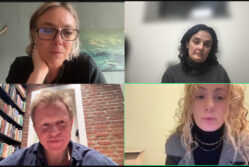Archive Event Highlight

China Hands Grapple With Censorship and Shifting Ground
Foreign journalists have long wrestled with China’s many
riddles. What makes its economy tick? How do its leaders make decisions? Are
censors gaining or losing ground? How can journalists make sure to get the
story right, complete with all the country’s nuances and contradictions?
On Friday, Sept. 12, the OPC, along with the Foreign
Correspondents Club of China and the Asia Society’s ChinaFile, assembled a team of writers and thinkers
to tackle big questions facing foreign media in the Middle Kingdom.
During a lunchtime panel, business writers and editors swapped
views on the future of China’s impenetrable economy, which plays by different
rules than the rest of the world.
Video Credits – OPC Producers: Patricia Kranz, Bill Holstein; Video: Lesley Topping, Craig Haft
Orville Schell, director of the Center on U.S.-China
Relations at the Asia Society, was dubious about the country’s chances to
become a world technology leader, though China has often defied predictions.
“I wouldn’t discount the ability of the Chinese to
squeeze enough out of the innovation equation to actually have substantial
benefit for themselves, whereas the West may continue at the very top end to
have a monopoly, but who knows, that could change too.”
“This is a very contradictory place where opposite things
going in opposite directions are true at the same time,” Schell added. “It’s
very hard in circumstances like that to actually get a trend line.”
John Bussey, assistant managing editor and executive
business editor of The Wall Street Journal, was more optimistic.
“On the technology curve, I think there’s just no
question that China will be at the very top, right along with us and with parts
of Europe,” he said. “It’s just a matter of time, just a generation of engineers
in the country.”
Later, a forum focused on how best to cover the country’s
nuances for foreign readers. Gady Epstein, Beijing bureau chief for The
Economist, said when demand drives coverage, some stories lose out.
“I think the human rights story is very hard to sell.
Because I think people are tired of it. And they’ve gotten tired of it over the
last ten to fifteen years,” he said. “There’s a combination of reader fatigue,
journalist fatigue and editor fatigue. Because it’s relentless.”
Barbara Demick, outgoing
Beijing bureau chief of the Los Angeles Times, noted that despite censorship, foreign
media increasingly serve a local readership, given social media and increasing Internet
access.
“Very ordinary people, not necessarily English speakers,
are reading our stuff or Chinese language versions of our stuff, or if they’re
not reading somebody they know is,” she said. “I’ve had many, many situations
where I’ve gone into a village and people have said ‘thanks for reporting this
story for the Chinese people.”
The afternoon schedule included an update on press
freedom, which featured the release of a report from the China Foreign
Correspondents’ Club. Kathleen McLaughlin,
a Knight Science Journalism fellow at MIT and Asia contributor to The
Economist and Guardian, presented some grim findings.
“Two-thirds of journalists who responded said they
experienced interference, harassment or violence while attempting to report in
China the previous year. Among those, 10 percent were subjected to manhandling
or physical force,” she said, quoting the report.
The 14-page position paper outlined some troubling
trends, with a rise in preemptive warnings against journalists, cyber attacks
on foreign media companies, and even visits from embassy staff outside of China
in journalists’ home countries.
Perhaps more worrying is increasing harassment of Chinese
staff, with about half of correspondents who have a news assistant saying that
their local staff members were harassed or intimidated at least once in the
last year, a figure that is up from 35 percent the year before. Sources were
also under increasing intimidation, according to the report.
“Once source was told ‘You know you can lose your life
for talking to a foreign journalist,’” McLaughlin said.
Joe Kahn, foreign editor
for The New York Times, said after China blocked the newspaper’s website
following coverage of a top leader’s wealth, the government offered a “roadmap”
to get the site unblocked and resume issuing visas.
“It comes down to ‘don’t
publish stories that we think are offensive, and you have to agree to do that
in writing,’ which we’re not going to do,” Kahn said.
Minky Worden, director of global initiatives for Human
Rights Watch, said despite increased aggression toward journalists, there is
some cause for hope in Hong Kong, which is under an international treaty,
separate from mainland China, that protects press freedom.
“The situation in China is probably at the worst low
since the post-89 period, and the situation in Hong Kong is the worst it has
been since the handover,” she said. “We’re at a great moment because the
political fight is about to go into the streets. If we can preserve and protect
press freedom in Hong Kong, it’s going to be a lot easier to improve it in
China.”
Meanwhile, social media followers waxed optimistic about
the use of digital tools for social and political change. Though China often
blocks websites or the Twitter-like Weibo, users tend to stay ahead of the
censors, panelists said.
Emily Parker,
author of “Now
I Know Who My Comrades Are: Voices From the Internet Underground,“ said China
is far more threatened by the formation of online communities than by specific
content.
“What I focused on mostly in my research and reporting is
less the power of the Internet to spread freedom of information, but the power
of the Internet to promote freedom of assembly, or freedom of virtual assembly
at least.”
David Wertime, editor of Tea Leaf Nation and Foreign
Policy, added that China’s restrictions on digital media could, over the long
term, cause a backlash that threatens the government’s controls.
“Countless tens of millions of Chinese have now actually
come face to face with that machinery, even if it’s having just one post
disappear. So it’s hard to say what the long term impact of that will be,” he
said. “It’s a whole generation of Chinese now that have experienced censorship
personally, which I think erodes credibility of government-sponsored media.”
Watch this site for more details about each panel.
Related Events



